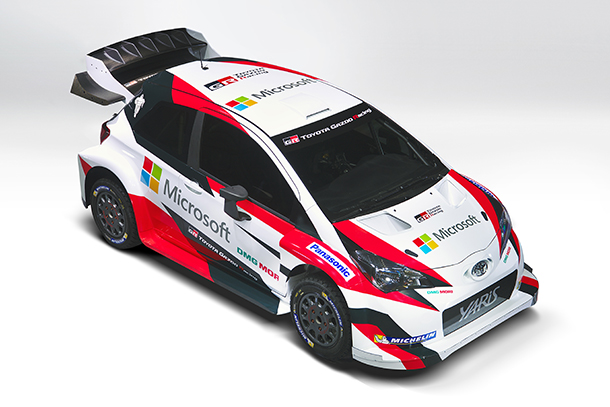Toyota Unveils Specifications of the New C-HR for the Japanese Market
- Distinctive styling that boldly fuses lightness and power is achieved through Toyota's unique and emotional Keen Look1 and Under Priority2 design expressions
- Responsive driving performance achieved by adding performance-enhancing features to the high level basic performance made possible by TNGA3
- Hybrid version boasts fuel efficiency that is among the highest within the compact crossover SUV class
- Four grades available: "G" and "S" with a 1.8-liter hybrid system, and "G-T" and "S-T" with a 1.2-liter turbo engine
- Toyota Safety Sense P, a collision avoidance assist package, offered as a standard in all grades
Toyota City, Japan, September 28, 2016―Toyota Motor Corporation today unveiled an overview of the Japanese market specifications of its new C-HR, or Coupé High-Rider. Toyota will begin accepting advance orders online4 in early November, and the market launch will follow at the end of 2016 at all Toyota, Toyopet, Toyota Corolla, and Nets dealers nationwide.

G (options shown)
Since the C-HR's debut as a concept vehicle at the 2014 Paris Motor Show, the crossover SUV has been exhibited elsewhere in Europe, such as the 66th International Motor Show 2015 in Frankfurt. Approximately one year since its display at the 44th Tokyo Motor Show, Toyota is now unveiling the Japanese market specifications of the mass-market version of the C-HR.
Through its distinctive styling and driving performance among other features, Toyota hopes to increase the demand for the C-HR from a wider range of customers within the growing compact SUV market.
Under the concept of the "Sensual Speed-Cross", the design of the C-HR features a diamond architectural theme, with eye-catching details that have been sculpted and chamfered to represent the facetted surfaces of a precision-cut gemstone. Viewed from any angle, the elegantly integrated detailing creates a delicate balance of precision and sensuality.
The driving concept behind the C-HR is that of responsive driving performance. With further refinements to the TNGA platform, the vehicle has improved chassis rigidity, handling stability and comfort. Furthermore, the driving performance has been thoroughly enhanced with repeated driving tests that have been conducted on varying types of roads throughout the world, including Europe and Japan.
Ahead of the market launch, Toyota plans to hold an advanced test drive5 at the Fuji Speedway on November 26.
Key points
1. Targeting a broader range of customers by introducing the C-HR into Japan's rapidly growing compact SUV market- The growing compact SUV market segment has expanded about 2.5 times over the last few years. More customers are placing greater importance on interior and exterior styling in comparison with other market segments. With its responsive driving performance and class-leading fuel efficiency in addition to its distinctive styling, the C-HR is expected to lead the compact SUV market.
- The C-HR is targeted mainly at information-savvy, compact SUV customers, including younger customers who are in their twenties and thirties. With its powerful suspension and eye-catching design, the C-HR is an expression of a new genre―an SUV with the feel of a coupe.
2. Simple and easy-to-choose grades
The standard S and S-T grades, and the more fully-feature G and G-T grades are available in both hybrid and turbo engine versions.
3. Advanced features, including the Toyota Safety Sense P package- All models come with the Toyota Safety Sense P, a collision avoidance assist package that includes a Pre-collision System, which detects has a pedestrian detection function, radar cruise control featuring all-speed tracking, Lane Departure Alert (with steering control), and Automatic High Beam (AHB).
- The Blind Spot Monitor uses radar to detect vehicles traveling within the side mirror's blind spot and the side mirror's LED indicator will light up or flash in order to warn the driver.
- When reversing out of a parking spot, the Rear Cross Traffic Alert system uses the Blind Spot Monitor's radar to detect any vehicle about to enter the backing path of the reversing vehicle, and alerts the driver via a buzzer and flashing indicator located in the side mirror.
1Toyota's unique front expression imparts an impression of intelligence and clarity, based on a combination of the dynamic Under Priority and an emphasis on the three-dimensional Toyota mark.
2Toyota's unique front design that emphasizes the lower grille and improves aerodynamic performance, cooling, and pedestrian protection safety.
3Toyota New Global Architecture: Toyota's company-wide program to structurally transform automobile design
The goal of TNGA is to dramatically improve the basic performance and marketability of Toyota vehicles by reforming and integrally developing new powertrain components, vehicle platforms, and parts.
4Toyota Motor Corporation's official website//www.toyota-global.com/
5Details will be posted on Toyota Motor Corporation's official website (//toyota.jp/).
Main features of the new C-HR
1. Exterior- The three-dimensional structure created by the contrast between the strongly tapered body based on a diamond architectural theme and the pronounced flaring of the wheel arches gives the new crossover a distinct outline with and extremely powerful stance.
- The modulated structure and glossy surface finish have created a slim and sleek cabin profile of a coupe.

- The sculpted diamond shape clearly highlighted by integrating the cabin with the back door and deeply carving out the lower part of the underbody, coupled with the pronounced flaring of the wheel arches, produced a bold and sensual profile.
- The C-HR's coupe-like styling is further enhanced by disguised rear door handles integrated within the C pillar
 |
 |
- The C-HR builds on two key elements of Toyota's design language―Keen Look and Under Priority. The slender upper grille flows from the Toyota badge into the sleek, aggressive wing extremities of the headlamp clusters and wraps fully around the front corners of the vehicle, which creates a bold, emphatic front, exuding a sense of wideness and stability.
- To the rear, the strongly tapered cabin integrates a top-hinged tailgate giving access to the loadspace. This contrasts with the pronounced flaring of the wheel arches, which give the new crossover a wide and extremely powerful stance.
2. Interior
- Based on the "Sensual Tech" design concept, the interior produces an unprecedented advanced feel.

- Soft pads leading from the instrument panel to the door trimmings and metallic-tone ornaments expresses an expansive space.
- The control panel, with various meters situated in the center, is positioned facing the driver, with all items laid out along a continuous line, allowing all driving operations to be carried out smoothly.
 |
 |
- The twin-lens, cylindrical type meter with radiating blue lines on its face expresses depth and innovation.
- The multi-information display (4.2-inch color TFT) displays information at high resolution.
- The sporty seats offer excellent support. Optimized seat pad thickness evenly distributes the pressure across the ischial bones, making long rides more comfortable.
3. Driving Performance
- The C-HR was developed with a focus on the ideas of "Response, Linearity and Consistency1" in order to achieve the key design concept of responsive driving performance.
- The TNGA platform has enabled the creation of vehicles with improved chassis rigidity with a low center of gravity, with handling stability and comfort when driving.

- The front uses newly developed Macpherson struts suspension system while the rear uses double-wishbone suspension. Furthermore, the use of large-diameter stabilizers and optimization of the damping characteristics of the shock absorbers help to provide superior steering stability and a comfortable ride.
- Structural adhesive is used in body joints to reduce torsional phenomena, ensuring superior steering stability and a comfortable ride.
- SACHS shock absorbers are offered as standard equipment. Urethane material had been adopted for the cushioning in the upper support for the first time by Toyota.
Other major features
- Excellent controllability and open field of vision- The minimum turning radius of 5.2 m provides maneuverability comparable to hatchbacks.
- The C-HR offers ample cabin space with a length of 1,715 mm and a width of 1,455 mm while keeping the overall height at 1,5502 mm, which can easily maneuver within multistory parking structures. An eye point at 1,2803 mm, slimmer A pillars, and the well-positioned the side mirrors help to ensure excellent visibility for the driver.
- Accelerator and brake pedals with excellent controllability
- The rigidity and revised internal structure of the accelerator pedal offer the driver highly precise control, enabling smooth acceleration during startup and highly responsive acceleration when the pedal is pressed.
- The brake pedal position and angle are optimized, and the newly designed bushing gives an improved sense of rigidity.
4. Other

Sequential turn signals, in which 12 LEDs light up sequentially from the inside to the outside, had been adopted for the first time in a Toyota brand vehicle.

A light source projects the C-HR logo on the ground, lighting the driver's way which makes going out at nighttime a fun activity.
Other main points include the following:
- Eight exterior colors are available, including newly developed Radiant Green Metallic and Metal Stream Metallic. Black and licorice brown are available as interior colors.
- The C-HR's 18-inch aluminum wheels with their combination of machine-cut highlights and black paintwork give the lower body an innovative and exciting feel.
1Response: The vehicle responds instantly to the driver's operation.
Linearity: The vehicle responds precisely according to the magnitude of the driver's operation.
Consistency: The vehicle responds consistently on any road surface condition and at any vehicle speed.
2This is for the hybrid version. The height of the turbo engine version is 1,565 mm.
3This is for the turbo engine version. The height of the hybrid version is 1,265 mm.
Images
 C-HR C-HR |
 C-HR C-HR |
 C-HR C-HR |
 C-HR C-HR |
 C-HR C-HR |
 C-HR C-HR |
 C-HR C-HR |
 C-HR C-HR |
 C-HR C-HR |
 C-HR C-HR |








































